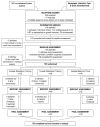Resistance training and executive functions: a 12-month randomized controlled trial
- PMID: 20101012
- PMCID: PMC3448565
- DOI: 10.1001/archinternmed.2009.494
Resistance training and executive functions: a 12-month randomized controlled trial
Abstract
Background: Cognitive decline among seniors is a pressing health care issue. Specific exercise training may combat cognitive decline. We compared the effect of once-weekly and twice-weekly resistance training with that of twice-weekly balance and tone exercise training on the performance of executive cognitive functions in senior women.
Methods: In this single-blinded randomized trial, 155 community-dwelling women aged 65 to 75 years living in Vancouver were randomly allocated to once-weekly (n = 54) or twice-weekly (n = 52) resistance training or twice-weekly balance and tone training (control group) (n = 49). The primary outcome measure was performance on the Stroop test, an executive cognitive test of selective attention and conflict resolution. Secondary outcomes of executive cognitive functions included set shifting as measured by the Trail Making Tests (parts A and B) and working memory as assessed by verbal digit span forward and backward tests. Gait speed, muscular function, and whole-brain volume were also secondary outcome measures.
Results: Both resistance training groups significantly improved their performance on the Stroop test compared with those in the balance and tone group (P < or = .03). Task performance improved by 12.6% and 10.9% in the once-weekly and twice-weekly resistance training groups, respectively; it deteriorated by 0.5% in the balance and tone group. Enhanced selective attention and conflict resolution was significantly associated with increased gait speed. Both resistance training groups demonstrated reductions in whole-brain volume compared with the balance and tone group at the end of the study (P < or = .03).
Conclusion: Twelve months of once-weekly or twice-weekly resistance training benefited the executive cognitive function of selective attention and conflict resolution among senior women.
Trial registration: clinicaltrials.gov Identifier: NCT00426881.
Conflict of interest statement
Comment in
-
Evidence regarding the benefits of physical exercise.Arch Intern Med. 2010 Jan 25;170(2):124-5. doi: 10.1001/archinternmed.2009.491. Arch Intern Med. 2010. PMID: 20101006 Free PMC article. No abstract available.
-
Twelve months of resistance training can improve the cognitive functioning of older women living in the community.J Physiother. 2010;56(3):200. doi: 10.1016/s1836-9553(10)70026-6. J Physiother. 2010. PMID: 20795927 No abstract available.
References
-
- Weuve J, Kang JH, Manson JE, Breteler MMB, Ware JH, Grodstein F. Physical Activity, Including Walking, and Cognitive Function in Older Women. JAMA. 2004;292:1454–1461. - PubMed
-
- Abbott RD, White LR, Ross GW, Masaki KH, Curb JD, Petrovitch H. Walking and Dementia in Physically Capable Elderly Men. JAMA. 2004;292:1447–1453. - PubMed
Publication types
MeSH terms
Associated data
Grants and funding
LinkOut - more resources
Full Text Sources
Medical


